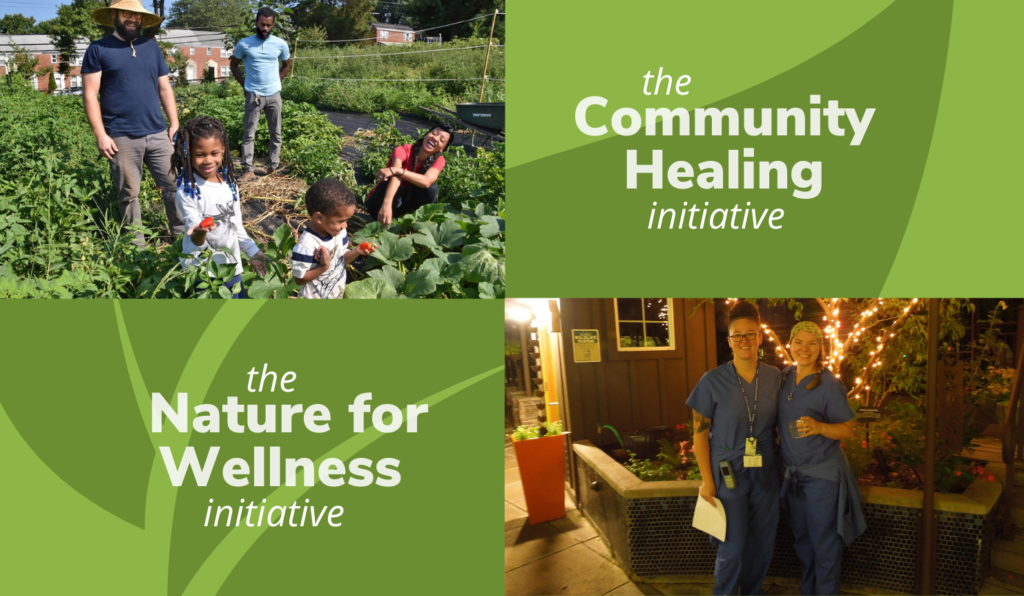This month marks the official launch of two new initiatives that first took shape during Nature Sacred’s strategic planning in 2020: the Community Healing Initiative and the Nature for Wellness Initiative. The two present a new formal codification of where our focus for new Sacred Places will be concentrated over the next five-year period: communities, particularly those with a dearth of available quality, accessible green space; and healthcare and higher education institutions.
“There’s no doubt that everyone needs nature,” said Nature Sacred CEO Alden Stoner. “But in some places, the need is more acute; for instance, in urban settings where grass, trees and parks are sparse; or in hospitals, where stress is consistently high – for patients, families and especially now – the medical staff responsible for their care.”
The Community Healing Initiative (CHI) is focused on helping urban communities heal through intentionally-designed Sacred Places, tailored to engage, uplift and rekindle community pride and unity. This initiative is launching with six projects already underway and multiple others in the pipeline. The Sacred Place at Bliss Meadows in Baltimore, MD, and the five Sacred Places at the Hospitality Hub of Memphis in Tennessee will be the first to open under the auspices of CHI.
Bliss Meadows, which is already gaining national attention, is led by Firesoul Atiya Wells, and intended to connect Black, Indigenous and People of Color (BIPOC) to African-American agricultural history and culture.
At the Hospitality Hub of Memphis’ new expanded center of operations, three Sacred Places will serve as intentional areas of respite, community gathering, and points of essential services. These spaces will function as a dedicated garden for staff, an outdoor space for case management services and a public Day Plaza and urban park space intended to provide respite from street and shelter life. At The Hub Hotel, a transitional shelter serving women experiencing homelessness in Memphis, two Sacred Places will provide residents and staff, along with surrounding community members and visitors, striking and engaging nature sanctuaries.
The Nature for Wellness (NFW) Initiative is focused on seeing more Sacred Places in hospitals and healthcare institutions, as well as on college and university campuses throughout the country. These are places where people are suffering various degrees of mental health strain; multiple sources of studies and statistics bear this out. It is well established at this point that hospitalization itself is damaging psychologically to patients and their families. Nurses and doctors are experiencing record levels of stress and burnout. Likewise, we are seeing a sharp rise in mental health problems among college students.
“Having access to nearby nature in hospitals can positively impact patient recovery; and it can help mitigate the long-term and very damaging impact of stress experienced by family members,” said Stoner, “Accessible green space can also address the growing crisis of physician and nurse stress and burnout that impacts everything from quality of patient care to quality of life of caregivers.”
Nature Sacred has partnered with hospitals to place 10 Sacred Places across the country, including Baltimore’s Johns Hopkins Bayview Medical Center and Portland’s Legacy Emanuel Medical Center. The latter is the home to The Terrace Garden, an award-winning Sacred Place that has become a model in how green spaces like these can improve care for patients and their families, as well as alleviate burnout for physicians, nurses and other hospital staff.
“Knowing what we do, it’s hard to imagine any hospital not investing in spaces like these,” Stoner said.
“Nature Sacred has evolved a mature body of work within the two areas over the past 25 years. By concentrating our focus here, we believe we have the potential to impact the greatest number of lives in the coming years.”
Nature Sacred’s goal is to see 100+ new Sacred Places in development under these initiatives by 2025. “Considering that we currently have more than 20 in our pipeline, which is more than we anticipated this point in time, we feel very optimistic about reaching our goal and sparking others to join this movement.”

